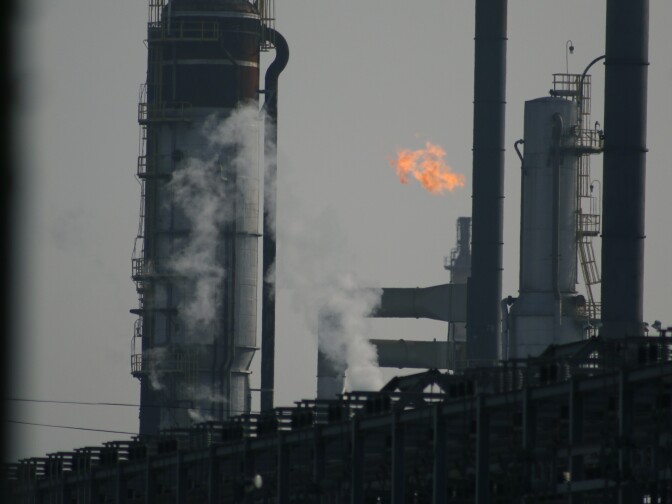This story is free to read because readers choose to support LAist. If you find value in independent local reporting, make a donation to power our newsroom today.
This archival content was originally written for and published on KPCC.org. Keep in mind that links and images may no longer work — and references may be outdated.
Air regulators propose stricter controls but not ban on toxic refinery chemical
Air quality regulators rolled out a new proposal this week to keep a toxic chemical used at refineries in Torrance and Wilmington from escaping and harming the public. They will explain the steps and take public testimony at a hearing in Torrance on Saturday.
South Coast Air Quality Management District staffers will present their plan to the governing board's five-member Refinery Committee. The plan stops well short of a phase-out or ban, which is a change from earlier discussions about the chemical known as hydrofluoric acid.
The Torrance Refinery operated by PBF Energy and the Valero refinery in Wilmington both use the substance in the process of turning crude oil into gasoline. Experts say hydrofluoric acid, if released, can form a deadly fog that can drift into neighborhoods and harm, or even kill, residents.
The AQMD's rule-making process regarding the chemical began in April, when discussions had centered on phasing out or banning the chemical.
AQMD scientists are now calling instead for new safeguards in handling the substance that would take eight years and up to $266 million dollars to put in place. Alternatively, they say the two refineries could also switch to a different chemical. But that could cost up to $330 million, according to two studies quoted by the AQMD. PBF Energy commissioned its own study that concluded the cost to use an alternative process would be twice to three times that amount.
The Torrance Refinery and Valero's refinery in Wilmington are the only two in California that use hydrofluoric acid. It is part of the alkylation process which adds high octane hydrocarbons to motor and aviation gasoline.
Hydrofluoric acid is dangerous when it is exposed to air because it can form a deadly vapor that can hug the ground and move around with the wind. Both refineries are close to heavily-populated neighborhoods.
Both refineries use what they call "modified hydrofluoric acid," which they say reduces the tendency of the chemical to vaporize and move off-site.
However, residents with the Torrance Refinery Action Alliance dispute that claim and last year provided research to AQMD to bolster their assertion that modified hydrofluoric acid is not safer.
That research triggered the AQMD's rulemaking process, which began in April. In the course of the past year's study of the chemical, the refineries were unable to persuade AQMD staff that modified hydrofluoric acid was much safer than uncut hydrofluoric acid.
The AQMD staff proposal would add three tiers of increasing, and increasingly costly, protections rolled out over eight years to keep modified hydrofluoric acid from harming workers or the public.
The first tier, costing up to $6 million, adds some basic protections around the tanks that hold the chemical and would be completed within one year. The second tier of protection, costing $50 to $100 million, would add automated systems for detecting and suppressing a leak of the chemical. That work would be need to be completed within three years.
The third tier, costing $50 to $150 million, calls for the chemical to be stored in underground tanks, and for the alkylation unit to be fully enclosed to protect it from an impact like a refinery explosion. That third step would take up to eight years to complete.
The plan offers the two refineries an alternative to the costly second and third tiers of protection, and that is adopting a different process, most likely, using sulfuric acid for alkylation.
"That's a lot of money either way," said David Petit, senior attorney with the Natural Resources Defense Council, an advocacy group that has been involved in the rulemaking and supports a ban. "But I think what you have to weigh that against is the cost to society" if lives were threatened or lost in a release of the chemical.
The downside of sulfuric acid, is that it must be trucked out to be regenerated at a plant away from the refinery, then trucked back in. Mike Karlovich, a spokesman for PBF Energy which owns the Torrance Refinery, said that step would add some 1,440 truck trips per month to Torrance and surrounding city streets.
The plant has not had an off-site release of the chemical in decades, Karlovich said.
"It's been in operation now for 51 years without an off-site release. We think that's pretty remarkable, and it shows that the plant can be run safely," he said.









